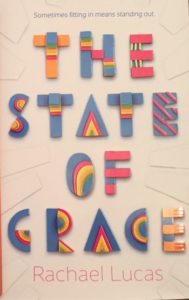 Grace, a 16-year-old girl living in a tourist town along the Scottish coast, has been diagnosed on the autism spectrum. She has a best friend who “gets” her, providing a bridge between her and the popular kids, and the school counselor has provided her with a pass that allows her to leave class if she becomes overstimulated. Some of the students, most notably mean-girl Holly, mistreat and bully her, but in a twist on the usual trope, Holly — not Grace — is the person that no one wants at their party. Grace finds joy and a place in the world by caring for an animal, in her case a horse. While riding that horse, she encounters Gabe, a new student at her school who has crashed his bicycle, and the two of them discover they have much in common, from their interest in Dr. Who to difficulties at school. Through her depiction of Gabe and Grace’s relationship, the author challenges the stereotype of autistic people as uninterested in or unable to establish romantic relationships.
Grace, a 16-year-old girl living in a tourist town along the Scottish coast, has been diagnosed on the autism spectrum. She has a best friend who “gets” her, providing a bridge between her and the popular kids, and the school counselor has provided her with a pass that allows her to leave class if she becomes overstimulated. Some of the students, most notably mean-girl Holly, mistreat and bully her, but in a twist on the usual trope, Holly — not Grace — is the person that no one wants at their party. Grace finds joy and a place in the world by caring for an animal, in her case a horse. While riding that horse, she encounters Gabe, a new student at her school who has crashed his bicycle, and the two of them discover they have much in common, from their interest in Dr. Who to difficulties at school. Through her depiction of Gabe and Grace’s relationship, the author challenges the stereotype of autistic people as uninterested in or unable to establish romantic relationships.
But not everything is sunny in Grace’s world — family changes and the arrival of her mother’s old friend have upset not only Grace but also her younger sister who acts out in a different way. Trying to impress Gabe and her other friends, Grace makes a reckless decision that has serious consequences, and she must figure out how to make amends to regain her valued place in the community.
The author The State of Grace, Rachael Lucas, is herself autistic and from Scotland, and the novel’s depth and complexity reflect its own voices provenance. Grace’s autism is central to her view of the world, but it doesn’t define her or the story, which explores coming of age themes, notably romantic relationships and dealing with changes in oneself and one’s family. While there are people who don’t accept Grace, Lucas portrays them as the exception rather than the norm, as the community embraces Grace, listens to her perspective (albeit belatedly in the case of her parents, leading to an “I told you so” moment), and gives her a second chance when she messes up. In this way, it’s a much-needed model of a supportive community and a valuable addition to the portrayals of autistic protagonists by own voices authors.
The State of Grace was published in the UK two years before coming out last month in North America. With its setting along the Scottish coast, it is a good choice for #WorldKidLit month (which includes books originally published in English outside North American as well as those in translation) as well as a nuanced and hopeful treatment of the family and community in which Grace lives.
4 comments for “Portraying an Autistic Teen in The State of Grace”